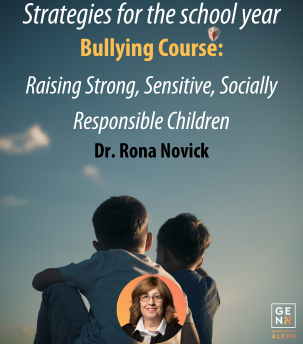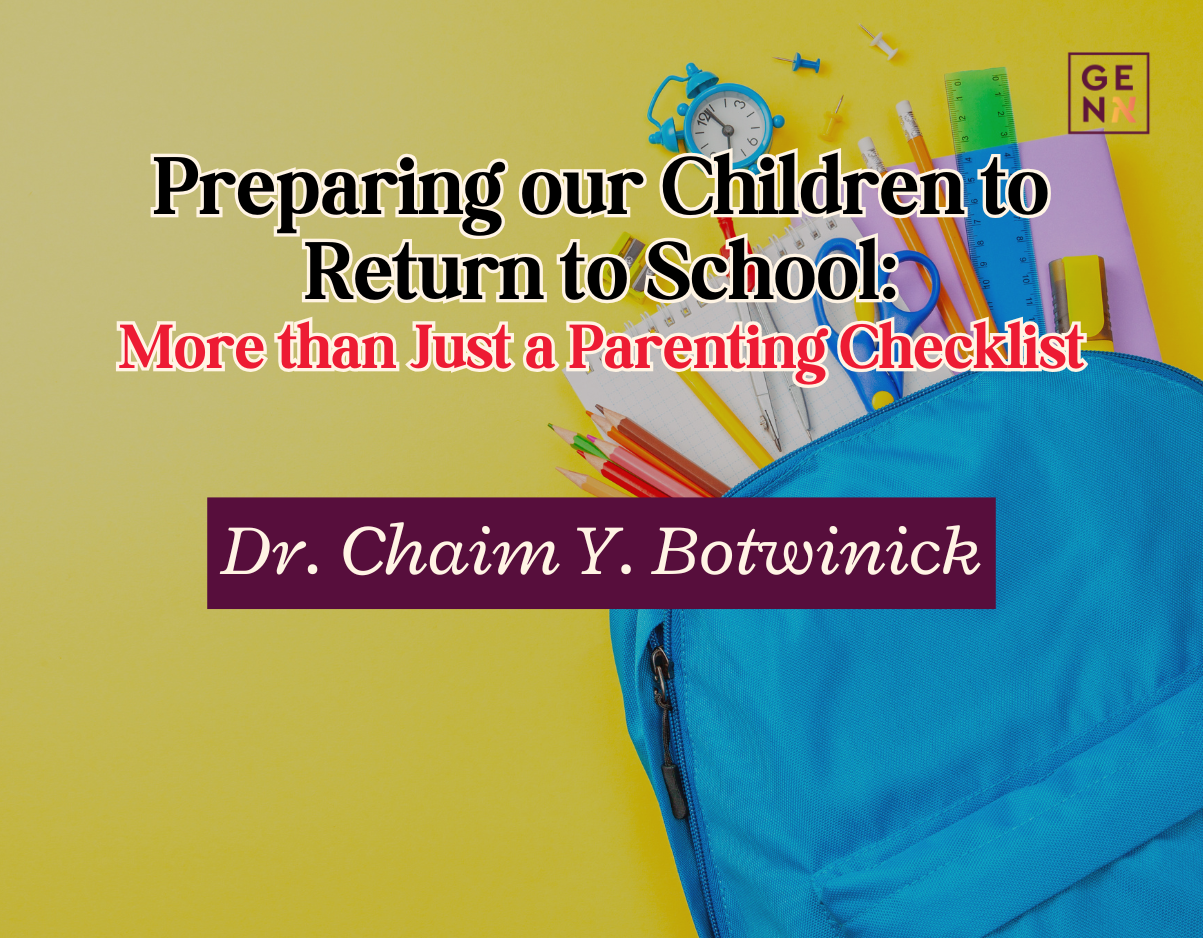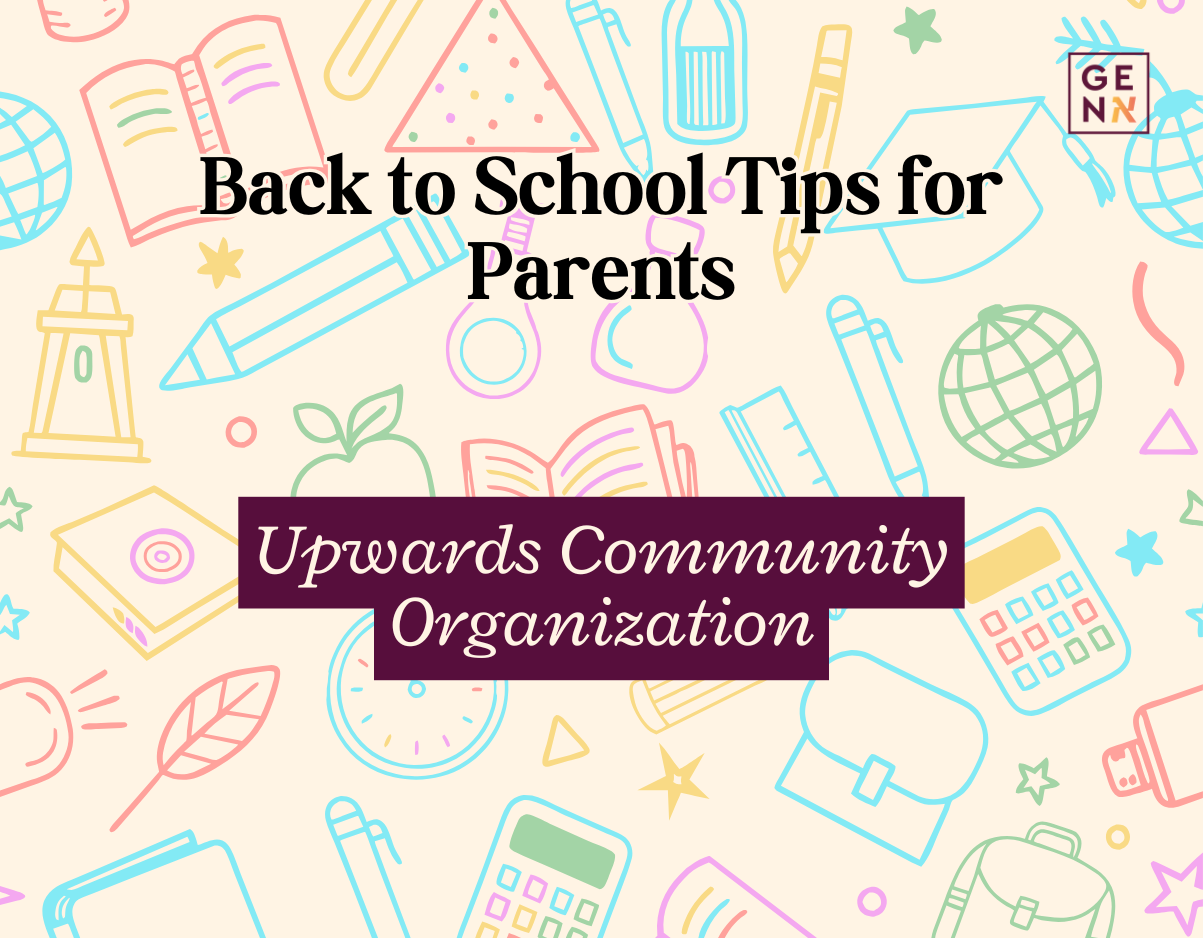It seems like yesterday when we were all making our long-awaited family summer plans. Some of these plans included sending our children to summer camp; others included quality family time and “staycations” yet others included a brief family vacation and setting aside designated time for our children to review and catch up on their reading, writing or other learning skills – whether they be in Judaic or general studies subjects. This latter summer activity appears to be more the norm than the exception as many of our schools now encourage and even require desperately needed summer review for their students. Parenthetically, there is a growing body of research which suggests that children who engage in summer review are far better prepared to take on the academic requirements during the coming school year. These findings are particularly striking for children who require remediation or modification and is deeply anchored in the pasuk, “chanoch lanaar al pi darko” (“train or teach a child according to his way”) (Mishlei 22.6)
As we prepare our children for the coming school year, we feel as if this past summer was like a fleeting moment in time. But, as is the case every year, here we are – on the eve of returning to school. To use an overly used expression, “where did the time go”?
For many of our children and their parents, the summer break was a refreshing and invigorating respite from the hustle and bustle routine of early wake-ups, homework, carpool schedules and long school days. For others, it was less so and yet for others it may have been a summer of stress and an emotional roller coast, depending upon familial circumstances and dispositions.
The one constant for all of our children is that during these summer months, they were no longer exposed to the protective cocoon of a place called school – the safe and structured environment which demanded and offered daily learning, educational programing, healthy socialization and above all, desperately needed structure.
For some of our children, the structure of the school day was sorely missing and absent from their summer experience; for others, they did not miss a beat and occupied themselves with healthy projects and activity, irrespective of structure. Either way, the summer months were a significant departure from school which in and of itself were significantly different then from our children’s daily school routine.
As parents, we are now faced with the arduous task and responsibility of transitioning our children back to school. For most parents, they have a set routines; for others, they are making it up as they move forward. Either way, it’s an activity fraught with excitement, a touch of anxiety and great anticipation…..for as we are reminded in Mishle 22:6: “It is easier to have children than to raise them.”
Preparing for the Transition Back to School:
As just indicated, children experienced their summer breaks in different and in distinct ways. As such, each parent prepares their child for their return to school in unique ways. Some families with many children have past years’ experience and rely heavily on a set pattern or past routine; those with fewer children mix it up and experiment with different options depending upon the child’s disposition; yet there are other parents who may be sending their child to a new school. In these cases, there is a totally different playbook and set of circumstance which will be briefly addressed later in this article.
Irrespective of whether the child is returning to the same school or to a new school, there are several fundamental transitional challenges that need to be addressed as parents prepare their children to return to school.
At the risk of presenting a punch-list or listing of to-do’s, there are select considerations which warrant serious attention.
As parents prepare to send their children off to school, many of our children may feel anxious and bit nervous about the prospect of returning to school. Interestingly enough, as much as our children feel this level of anxiousness, so do many of their parents. In these cases it is essential that the parent do everything possible in order to reduce their own personal anxiety levels. Children are very impressionable. When a parent is anxious or exhibits any form of anxiety, you can be certain that their children will feel it and at times exhibit the same behavior patterns, concerns and worries as their parents. You can also be sure that it impacts negatively upon the child. As the great Sage of Vilna (the Vilna Gaon) is quoted as saying: Like a child, like a parent: children follow parents by example and copy their character (and behavior). Here too, parents must be diligent and careful not to give off negative or a less than positive vibes to their children, irrespective of circumstance. This is when parent modeling becomes an absolute necessity.
There are many concerns and questions which parents may feel on the eve of sending their children back to school.
They may include:
- Will my child adapt well to new classes, new friends and/or new teachers?
- Will my child like her/his new teacher(s) or rebbeim?
- Will my child be able to maintain the required academic requirements and grade standards in general and in Judaic studies?
- Will my child’s new teachers truly understand and appreciate the academic and social strengths, weakness and personality nuances of my child.
- Do the teachers have prior knowledge or a handle on my child’s strengths and weakness? Did they consult with her/his teachers from last year?
- Should I meet with the teachers and/or principals prior to the start of school?
All of these questions and concerns are normal. In fact, they represent the normal form of concern for many parents.
Although there is never a one-size-fits-all response, if these parental questions or concerns are disruptive to the extent that they impact negatively on a parent or a child’s ability to transition back to school, there are several viable options.
- The parent may choose to schedule time to meet with the child’s principal, guidance counselor and /or with teachers prior to the beginning of school; many schools accommodate these requests with group/team meeting and consult so that all parties are present at the same time;
- Alternatively, the parent may want to schedule a phone or zoom consultation with the principal, teacher, rebbe and or counselor in order to address the concerns.
It is advisable that the parent not wait until the first week of school in order to have or schedule these important conversations. In fact, it is recommended that these conversations take place either during the summer – or weeks prior to school….or even at the tail end of the prior school year.
Waiting until school starts to have these important conversations does a disservice to the child and parent; and shortchanges the child, parent and teachers/administrators. Remember, once school begins, everyone becomes preoccupied with the start of school which will by definition, reduces the amount of attention needed to focus on your child or on the issues and concerns at hand.
Several Suggestions for Successful Back-to School Transitioning:
It is important to note that returning to school following a summer break, is the perfect time for children to open up to parents regarding their concerns, fears, and worries. Don’t minimize these conversations. They are an invaluable aspect of a child’s growth and social development and at the same time creates a powerful bonding force between parents and children. Encourage children to open-up. Never minimize or disregard a child’s concern about returning to school. Always be responsive, understanding, and empathetic; and, above all…be present in the conversation. Children feel it, need it and cling to it.
Other important suggestions include but are not limited to:
- creating a supportive and loving home environment that invites conversation with your children;
- being proactive by asking your child if “all is ok”; or if anything is concerning them about returning to school;
- helping resolve back to school issues and concerns together and invite your child to suggest solutions;
- empower and encourage your child to suggest ways in which to resolve issues which may arise in school;
- letting the child know that you as parent will always be available to help resolve and trouble-shoot any issues that may arise during the initial back to school transition period;
- let your child know that you love her/him unconditionally and that transitions to school (and throughout life) can be challenging for everyone at varying degrees;
- upon returning from the first, second and third days of school, set aside uninterrupted quality time to let your child describe her/his experiences in school….what they liked about their classes; what they disliked; and their general feeling, attitude and perception;
- after the first day of school, establish a daily routine for your child upon her his return home after school; be certain not to skip any routine aspects of your day like repeating grace after means, davening, giving tzedaka or participating in chesed These are of particular importance especially on weekends when the child is not in school;
- let your child know how proud you are about the fact that she or he is now entering the next grade level;
It is important to note that the challenge for parents becomes even more compounded and/or complex with larger families. It stands to reason that the larger the family, the greater the change. Engage your spouse if possible to ensure that whatever you are doing to ensure smooth a transition back to school, it is being done as a family unit – each caring for one another. This gives the child a sense of confidence and security that “we are all in this together”.
As I indicated in the beginning of this article, a child’s transition to a new school may be significantly different than for children returning to the same school in which she/he is familiar. The level of unknowns are greater. Therefore the anxiety level may in fact be somewhat greater.
In cases where a child will be attending a totally new school, it is essential that the parent and child meet with the administration in order to address areas of concern or uncertainty. It is also essential that the parent create a positive vibe at home which focusses upon the beauty and excitement of new beginnings, new friends and new teachers. Again, the same approach as with a child returning to a familiar school. The only difference is that the parent’s point of focus and reference is the new school environment.
The new school transition experience, depending upon the maturity level of the child, can be compared to any new experience in life. It requires patience, understanding, confidence, optimism and positivity.
Finally, as indicated earlier, the same level of anxiety, concern and uncertainty that is expressed by the child can be seen and experienced by the parent. A new school for the child is the same new school for the parent…except of course on a different emotional maturity level.
It is therefore imperative that the parent attend all school and parent orientation sessions and even request the names of parents with whom she/he can discuss these concerns. Meeting with other parents of children in the same grade level or age group usually has a very calming effect on these levels of concern or uncertainty. The more parents learn about the curriculum and academic expectations, as well as opportunities meet with other parents, teachers and rabbeim, the better prepared they will be for their children’s transition.
This principle or axiom is similar to Torah study……..the more torah study and learning, the more wisdom (Avot 2:8)
End Note:
As parents prepare their children for the new school year, it is essential to always be mindful that children are by-and-large very sensitive to change and to changing routines and environments. This reality strongly suggests (and even demands) that parents rise to the occasion in order to ensure their children’s comfort zone during this critical transition period. If a parent is struggling with this adjustment or transition, it is advisable that the parent discuss this challenge with the school counselor, psychologist, Dean or Rosh HaYeshiva.
The more these issues and concerns are addressed at the front end of a child’s school transition process, the smother and hopefully the more seamless the transition.
Remember……. the time, energy, emotion, care, love and attention we devote to this important transition will result in a positive, secure and meaningful experience for the child.
It is our hope that all of our parents and their children be blessed with excellent health and hatzlacha as they embark upon a successful new year of meaningful learning and chinuch excellence.
Veshinantam Levachecha (Thou shalt teach them diligently to your children……Devarim 6:7)
An integral part of this commandment is to ensure that our children are exposed to the right environments and conditions for meaningful education and for successful educational transitions.
Submit your questions
"*" indicates required fields










